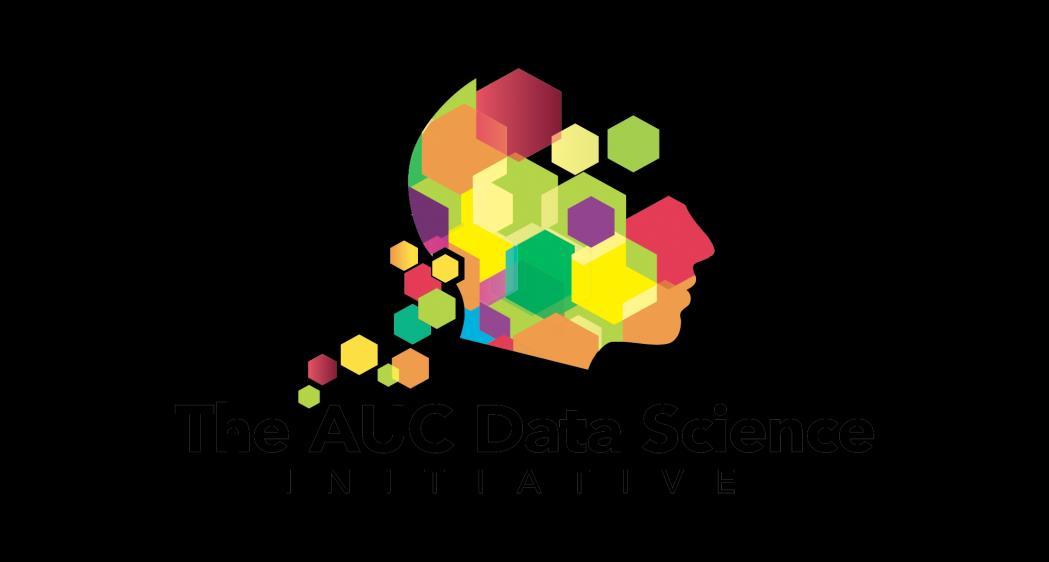

FACULTY DEVELOPMENT SUMMER INSTITUTE
COURSE: DATA AND THE AFRICAN DIASPORA
Dr. Ivis Renee King, Deputy Director
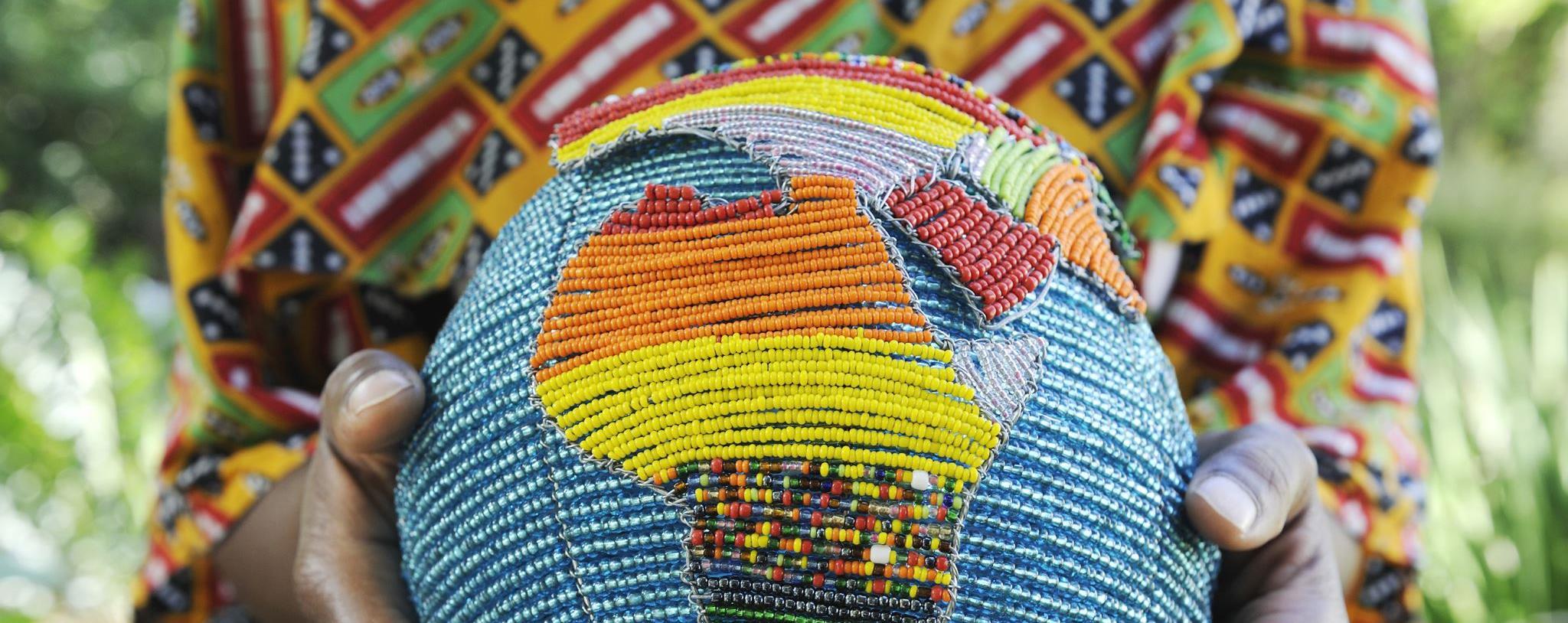
Award Overview
This NSF-funded project brings together expertise across disciplines to enhance STEM education at HBCUs through culturally relevant data science approaches.



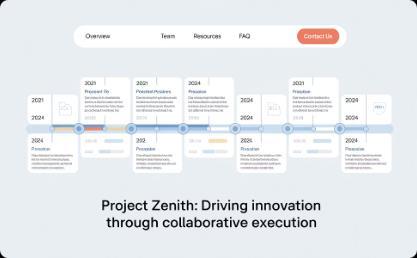
NSF Program
Program: Equity for Excellence in STEM
EDU Directorate for STEM Education
Award Abstract # 2136382
NSF Org: EES Division of Equity for Excellence
Excellence in STEM
Research Team
Talitha Washington (Principal Investigator) Investigator)
Moses Garuba (Co-Principal Investigator)
Institution & Funding
Recipient: CLARK ATLANTA UNIVERSITY, INC.
Sajid Hussain (Co-Principal Investigator) Investigator)
LaTanya Brown-Robertson (Co-Principal Investigator)
Jerry Volcy (Co-Principal Investigator)
Award Number: 2136382
Award Instrument: Standard Grant
Total Award Amount: $99,962.00
Project Timeline
Initial Amendment: August 31, 2021
Start Date: September 1, 2021
End Date: August 31, 2024 (Estimated)
Funding Period: FY 2021 = $99,962.00
Project Mission and Goals

HBCU-UP Commitment
Commitment
The HBCU Undergraduate Program aims to improve STEM education at Historically Black Colleges and Universities. Its goal is to help more students join the nation's STEM workforce.

Innovation Focus
The program funds new teaching approaches to better prepare HBCU students for success. These innovations help students thrive in STEM careers and graduate programs.

Framework Development
Development
This project at Clark Atlanta University will help create a model for data science teaching that other HBCUs can use.
Workshop Design and Approach
The proposed exploratory discovery workshop by the Clark Atlanta University Data Science Initiative aims to advance new knowledge and practice around practice around culturally reflective data science and data science education with potential national impact.

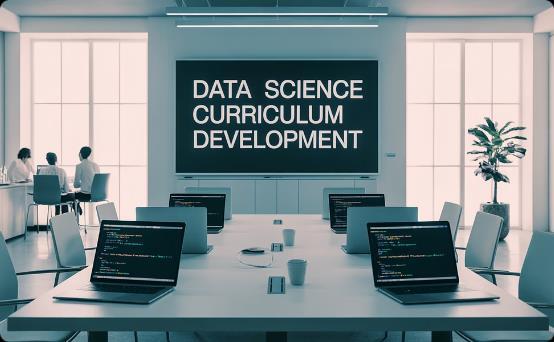

Interdisciplinary Collaboration
Convening approximately 60 expert participants at the intersection of data science, social equity, and undergraduate STEM education.
Culturally Reflective Approach
Leveraging data sets from the African Diaspora to create more inclusive and representative data science education.
Three-Day Intensive Workshop
Participants actively collaborate to develop, test, and refine innovative undergraduate data science modules that incorporate social and racial justice.
Workshop Outcomes and Deliverables


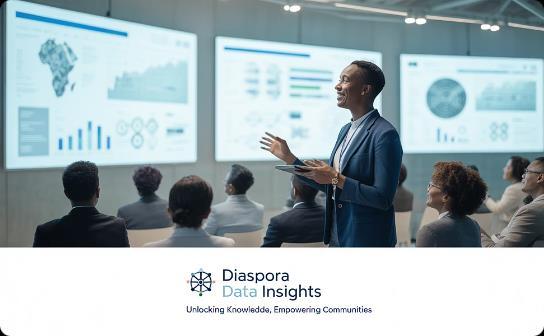
Knowledge Sharing
Participants will share ways to create teaching materials about the African diaspora. They will find good data sets, learn learn how to talk about race in class, and and discover teaching tools that connect connect with students' backgrounds.
Project Evaluation
We will check how well the workshop is is working during and after it happens. This This helps us improve activities and collect collect ideas about making data science science education better using African diaspora data.
Community Sharing
We will share what we learn with others. others. This includes a public talk, a report, a report, a short summary, examples, and and talks at conferences.
Project Outcomes Report
This Project Outcomes Report for the General Public is displayed verbatim as submitted by the Principal Investigator (PI) for this award. Any opinions, findings, and conclusions findings, and conclusions or recommendations expressed in this Report are those of the PI and do not necessarily reflect the views of the National Science Foundation; NSF Science Foundation; NSF has not approved or endorsed its content.



Three-Day Virtual Workshop
The Data and African Diaspora Workshop, held May 1618, 2022, brought together 57 participants in a virtual environment designed for collaborative curriculum development.
HBCU Faculty Participation
39 faculty and researchers from 14 different Historically Black Colleges and Universities collaborated to integrate culturally relevant data science into undergraduate education.
Culturally Relevant Module Design
Participants designed innovative data science modules incorporating social and racial justice themes related to the African diaspora to enhance undergraduate technical education.
Impact and Future Directions



Consensus Report
The workshop resulted in a consensus report entitled "Advancing Culturally Relevant Data Science: Insights from the from the Data and African Diaspora Workshop" that outlines outlines promising practices for teaching data science in a a culturally responsive way. Key strategies identified include include developing modules that address realworld issues issues affecting Black communities, creating safe spaces for for sensitive racial conversations in diverse classrooms, and and ensuring interdisciplinary collaboration.
Diversifying the Field
By focusing on the African diaspora and integrating social social justice into data science education, this project aims to aims to diversify the field and better prepare all students to use students to use data science in addressing social and economic economic inequalities. The creation of a national learning learning network was another important outcome, ensuring ensuring continued collaboration and resource sharing across across HBCUs.
Future Research Potential
This project has the potential to inform future research and and collaboration around how to practice undergraduate data undergraduate data science education that explores topics of topics of the African diaspora with the aim of improving data data science education for all students. This award reflects reflects NSF's statutory mission and has been deemed worthy of worthy of support through evaluation using the Foundation's Foundation's intellectual merit and broader impacts review review criteria.
Last Modified: 12/19/2024 Modified by: Talitha Washington

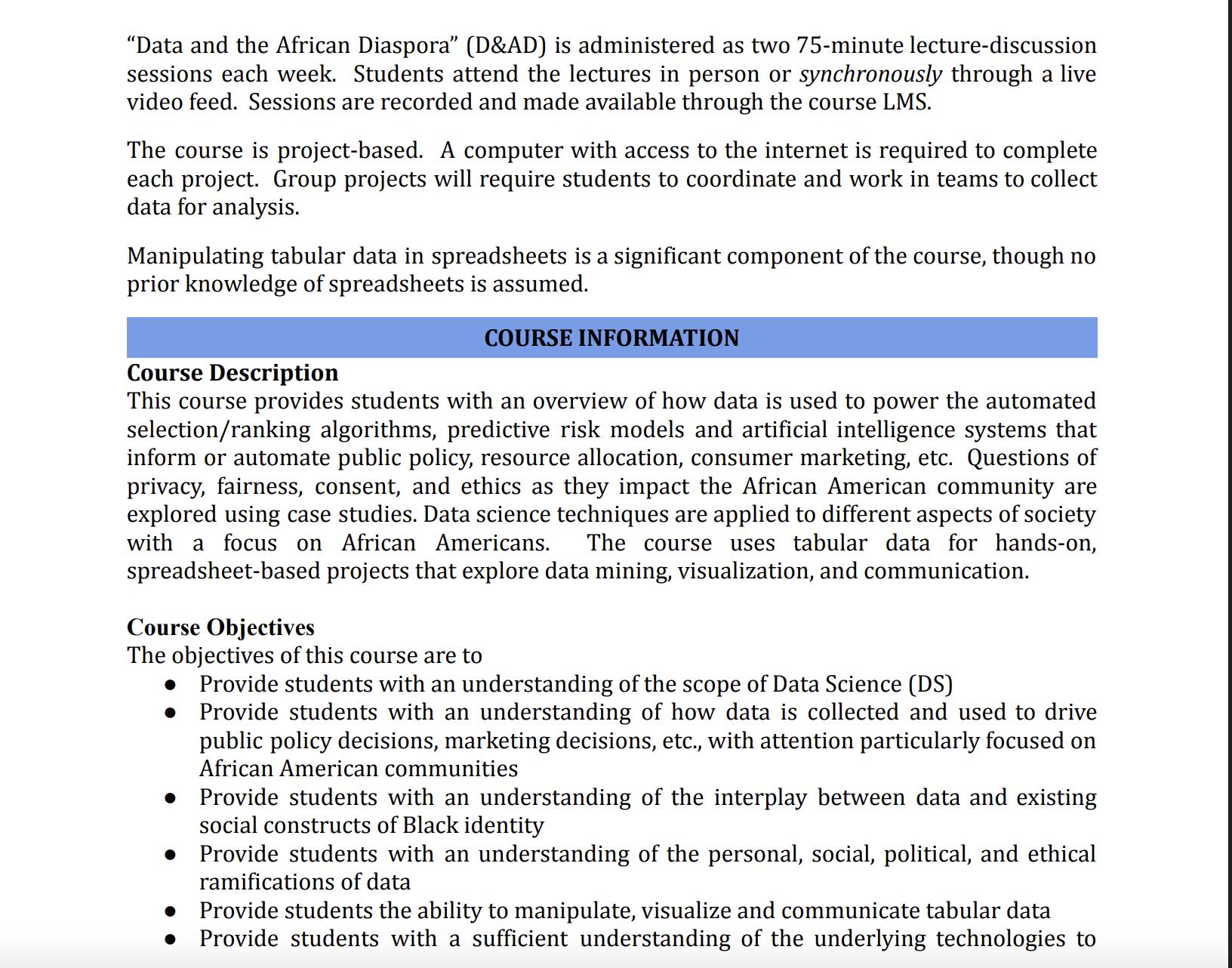
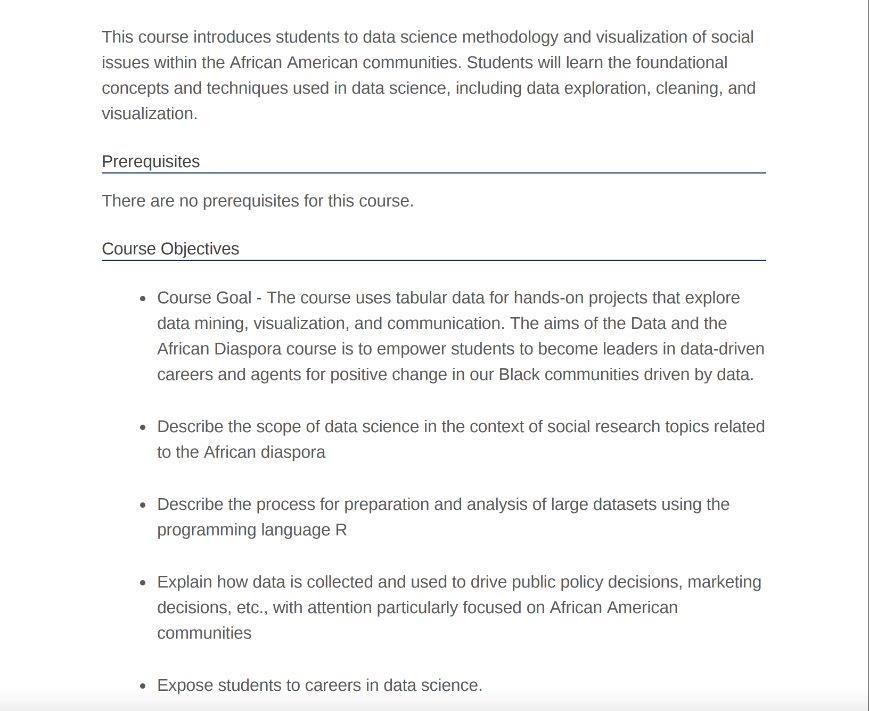
KEY OUTPUTS
Course Syllabus
CANVAS Blueprint Course
Materials/Textbook/Certificate
14 Weekly Activities
Data Set Repository
Pre and Post Survey


COURSE DEVELOPMENT

COURSE OVERVIEW

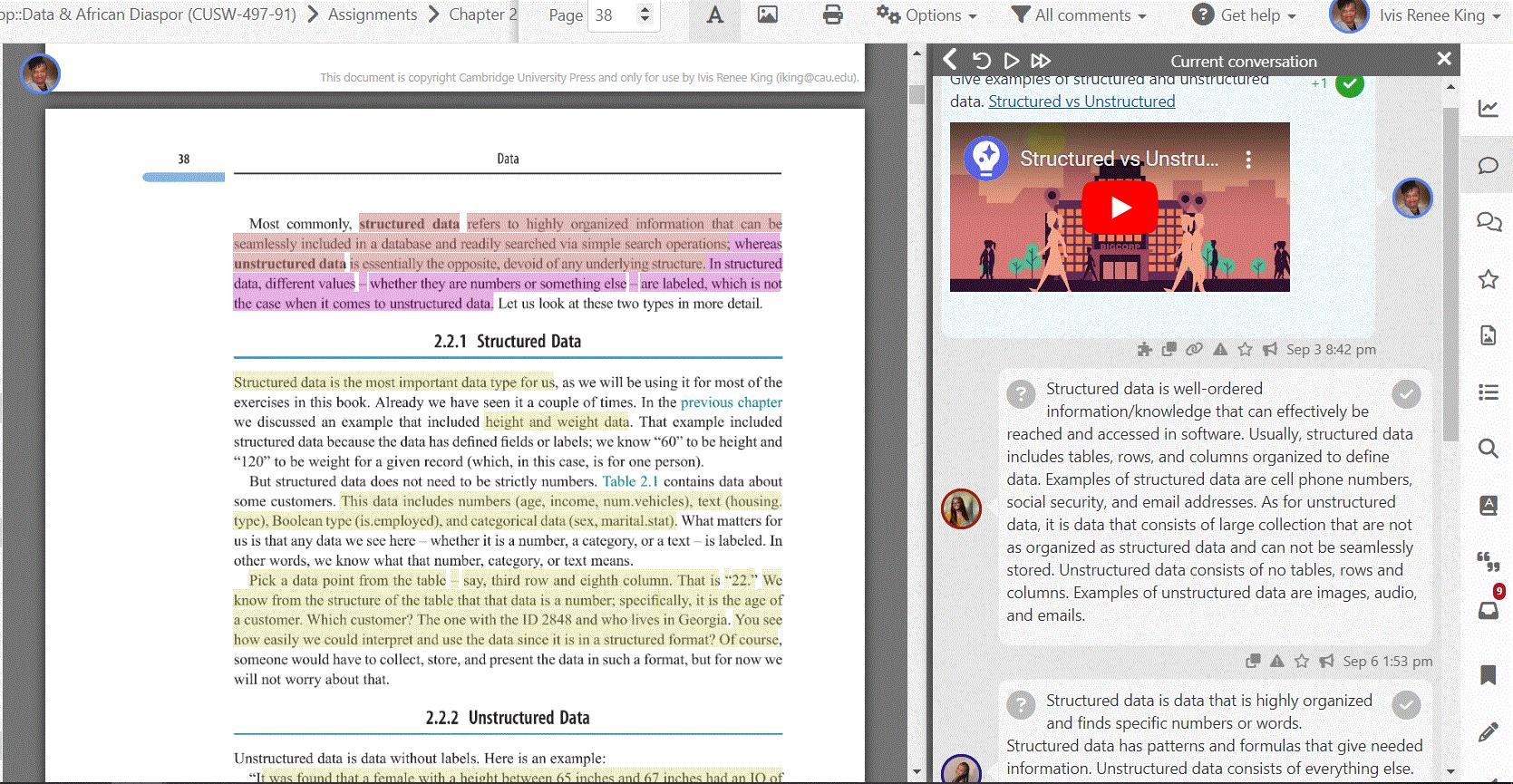


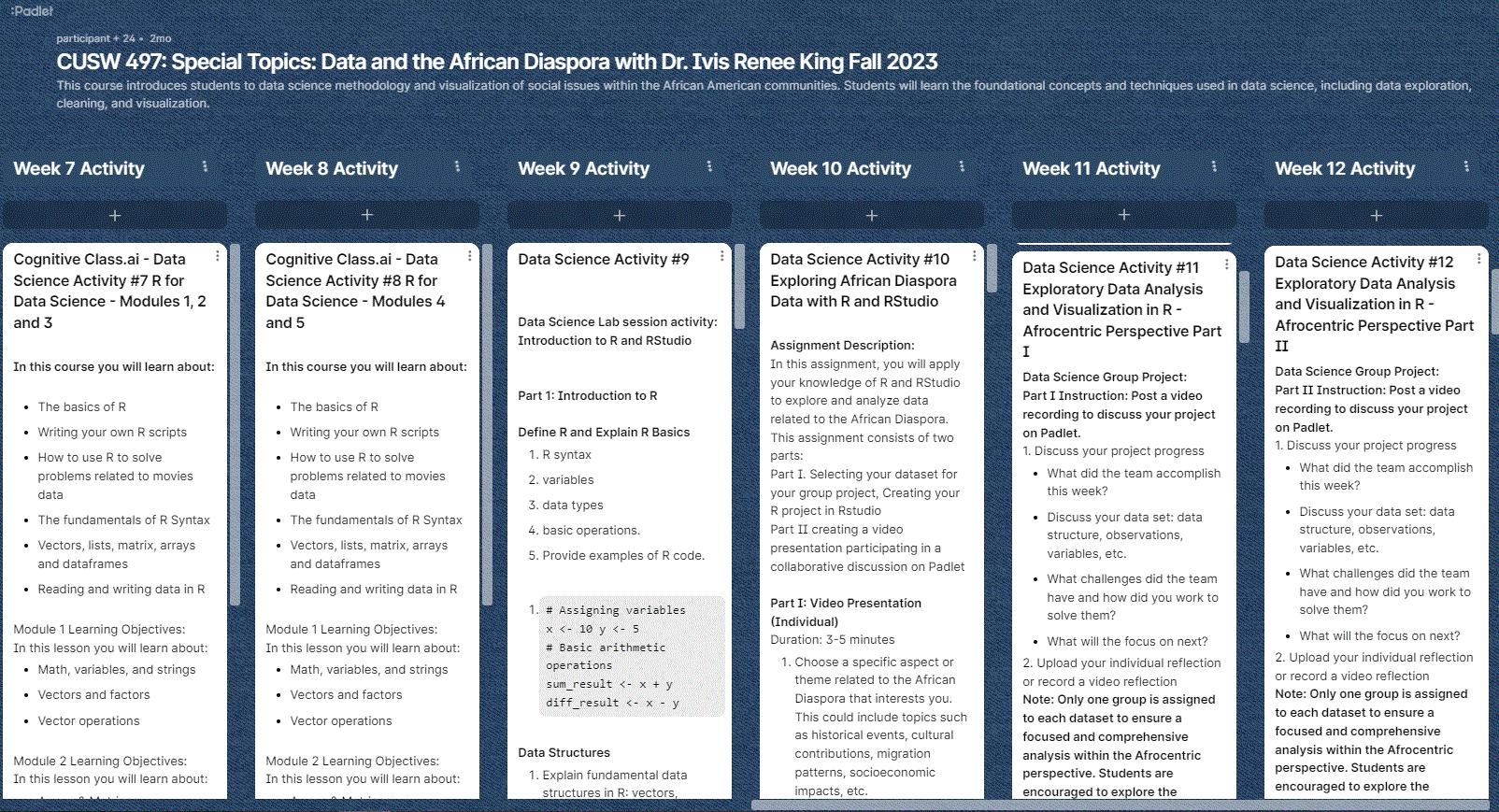

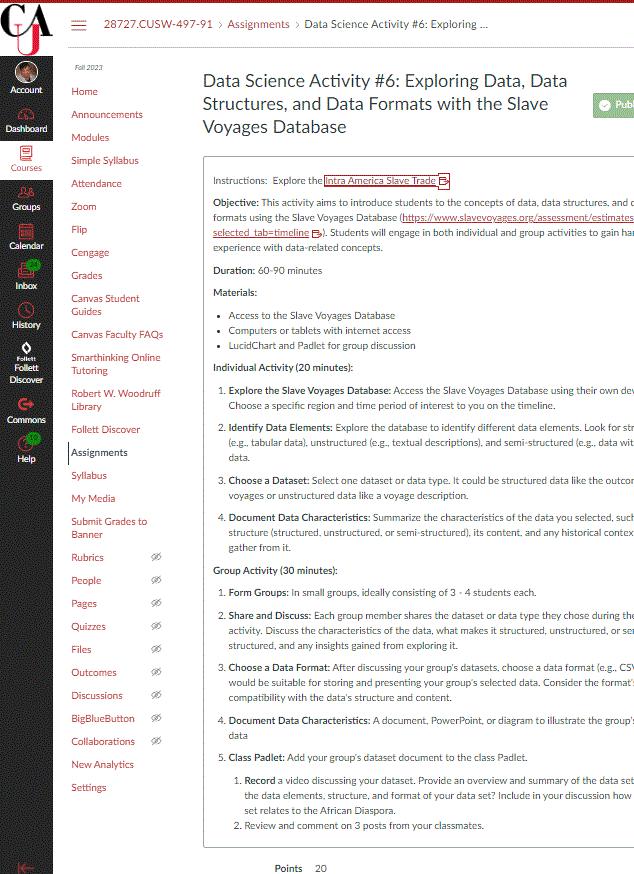
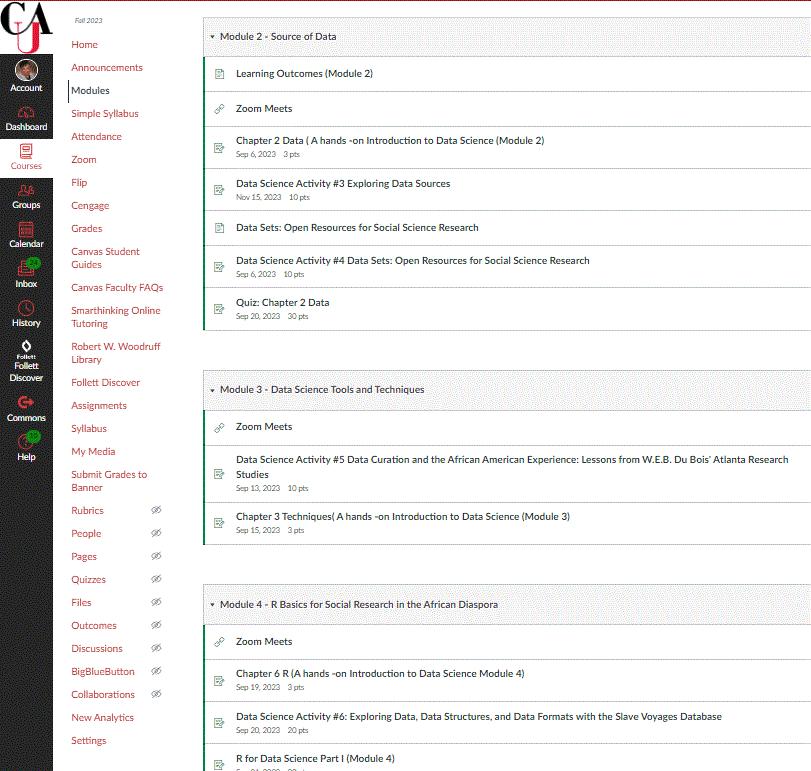
WEEKLY ACTIVITIES


WHAT ARE THE PROPOSED COURSES?

PLANNED START: FALL 2025
Draft New Program
Proposal
• Spring 2024
Department and School Curriculum Committee • Fall 2024
University Curriculum Committee
• Spring 2025
Academic
Council
• Spring 2025
University
Senate • Spring 2025

MRS. YVONNE PHILLIPS-TAYLOR
DATA SCIENCE PROFESSIONAL
CLO 1: DATA LITERACY AND ETHICS IN SOCIAL RESEARCH
• SLO 1.1: Students will evaluate and critique the ethical implications of using digital trace data and administrative records in social research, analyzing potential harms and benefits to research participants and society.
• SLO 1.2: Students will assess privacy protection measures and consent protocols for digital data collection, determine appropriate safeguards for different data types, and implement data protection procedures in research design.
• SLO 1.3: Students will identify sources of algorithmic bias in social data analysis, examine how bias manifests in different analytical approaches, and evaluate strategies for bias mitigation.
• SLO 1.4: Students will develop and justify a comprehensive ethical decision-making framework for social data science research, synthesize multiple ethical considerations, and defend their approach to ethical trade-offs in research design.
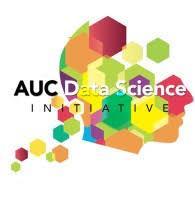
CLO 2: EXPLORATORY DATA ANALYSIS FOR SOCIAL SCIENCE
• SLO 2.1: Students will identify key principles of effective data visualization and explain how different chart types, color schemes, and design elements communicate specific messages to different audiences.
• SLO 2.2: Students will apply visualization best practices to create clear, accurate charts and graphs using appropriate tools, demonstrating proper use of scales, labels, and formatting conventions.
• SLO 2.3: Students will recognize effective visualization principles, explain appropriate chart selection, and apply best practices to create accurate, clear data visualizations.
• SLO 2.4: Students will analyze and evaluate existing visualizations for effectiveness and bias, then design comprehensive visual narratives for diverse audiences.

CLO 3: SPECIALIZED SOCIAL DATA METHODS
• SLO 3.1: will identify appropriate text analysis methods for different social science research questions, explain the theoretical foundations of computational text analysis, and describe how textual data reflects social phenomena and human behavior.
• SLO 3.2: Students will apply text preprocessing techniques (tokenization, cleaning, normalization), execute basic natural language processing methods (sentiment analysis, word frequency, n-grams), and implement text analysis workflows using appropriate computational tools.
• SLO 3.3: Students will analyze textual patterns to detect themes, topics, and sentiment trends, examine relationships between textual features and social variables, and investigate how language use varies across different social groups or contexts.
• SLO 3.4: Students will evaluate the validity and limitations of text analysis findings, critique computational approaches for potential bias, interpret results within social science theoretical frameworks, and synthesize textual evidence with other data sources to generate comprehensive social insights.
CLO 1: DATA LITERACY AND ETHICS IN SOCIAL RESEARCH
• •SLO 1.1: Students will evaluate and critique the ethical implications of using digital trace data and administrative records in social research, analyzing potential harms and benefits to research participants and society.
• •SLO 1.2: Students will assess privacy protection measures and consent protocols for digital data collection, determine appropriate safeguards for different data types, and implement data protection procedures in research design.
• •SLO 1.3: Students will identify sources of algorithmic bias in social data analysis, examine how bias manifests in different analytical approaches, and evaluate strategies for bias mitigation.
• •SLO 1.4: Students will develop and justify a comprehensive ethical decision-making framework for social data science research, synthesize multiple ethical considerations, and defend their approach to ethical trade-offs in research design.

